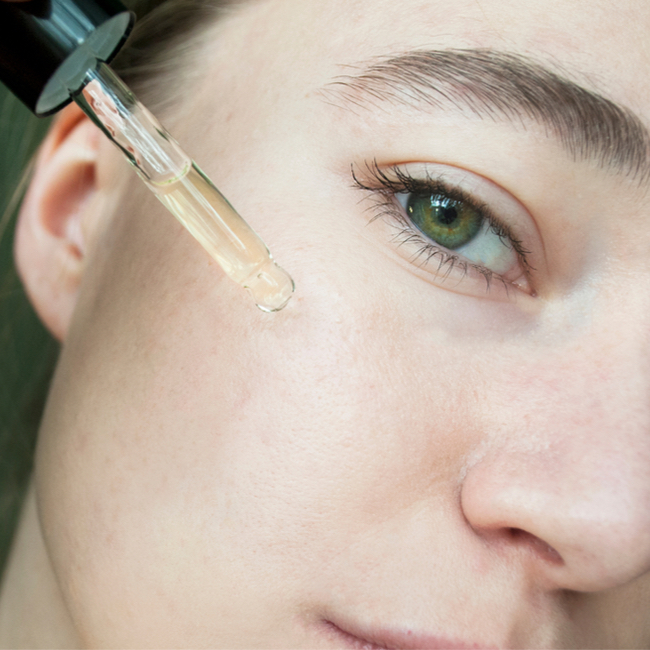
Derived from the Melaleuca alternifolia tree in Australia, tea tree oil is a multi-functional oil which can be used on hair, skin, and nails for an all-around healthier appearance. Known for its anti-bacterial and anti-inflammatory benefits, tea tree oil has most commonly been used for treating acne-prone skin and preventing new blemishes from developing as it is non-comedogenic and will not clog the pores.
According to NYC dermatologist Dr. Hadley King, tea tree oil can be particularly useful if you struggle with sensitive skin, referencing a study which compares the uses of benzoyl peroxide and this classic oil for acne treatment. While benzoyl peroxide is often used to smooth breakout-prone skin, tea tree oil is a less potent option for those looking for a gentle solution for blemish control that won’t exasperate existing issues.
For those with dry skin as well, tea tree oil is a significantly less drying option which may have a similar effect to benzoyl peroxide without causing further irritation and sucking the moisture out of your skin.“Benzoyl peroxide can be irritating and drying to the skin. Tea tree oil is less irritating, but it may not be as potent,” notes King. Ultimately you will have to assess the severity of your acne in tandem with your skin type in order to determine the potency of the product you’re looking for. Don’t want to cause redness or skin flare ups? Tea tree oil may be your ideal solution.
While studies are still relatively limited regarding the extent to which tea tree oil can transform your skin, health study results have shown that this oil can also help to treat certain bacterial issues such as athletes foot on top of the classic acne usage. Seeing as tea tree oil is anti-inflammatory, it can also help with flare ups on the skin which may stem from breakouts, calming your overall complexion.
It’s worth noting, however, that as with every skincare solution there are particular drawbacks that should be taken into consideration before integrating tea tree oil back into your skincare routine. With less data to determine the efficacy of the formula, tea tree oil certainly lacks the extensive data that other acne fighting products do.
Not only this, but King notes that studies have shown tea tree oil may be a hormone disruptor, with the NIEHS suggesting that they “should be used with caution.” King also adds, “Tea tree oil can cause both irritant and allergic reactions. Since irritant reactions may frequently be avoided by using lower concentrations of the irritant, this supports the idea of using well-formulated products rather than pure oil.” That being said, using a lower concentration formula of tea tree oil can mitigate the irritation--so long as you don’t use this product in combination with benzoyl peroxide for treating acne.
Perfect for usage twice a day, tea tree oil continues to be a dermatologist favorite when it comes to gently treating acne without the irritation of benzoyl peroxide. With anti-bacterial and anti-inflammatory properties, this old-school skincare staple still holds up as a solution to acne prone skin which may also suffer from dryness or a propensity for irritation.
Although less studied than its other breakout-treating counterparts, tea tree oil is still regarded as a valuable addition to your skin routine from morning to night if you’re looking for a more simplistic, less harsh solution to the ingredients more popular in the skincare world at the moment. While not new, that hardly makes tea tree oil any less valuable in your beauty lineup.


